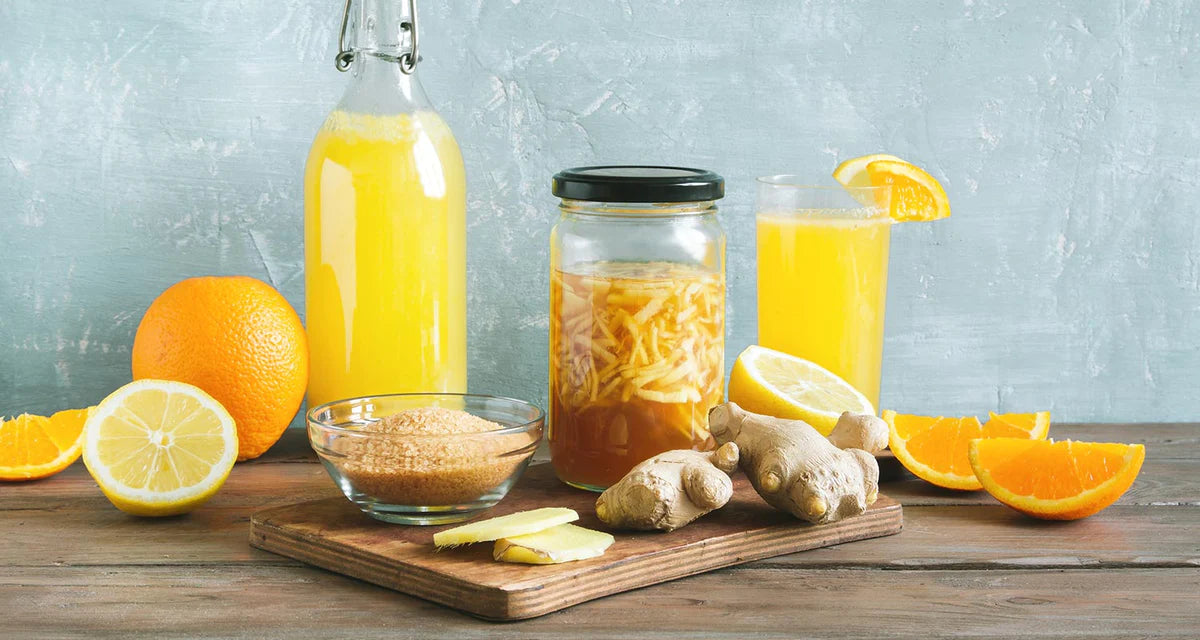All About Kombucha
You’ve no doubt heard about the probiotic drink kombucha, even if you haven’t tried it. The ancient ferment...

You’ve no doubt heard about the probiotic drink kombucha, even if you haven’t tried it. The ancient fermented tea drink is arguably one of the hottest health trends here in Australia and around the world for its role in gut health. In fact, sales of the slightly sweet-sour tasting, carbonated drink are booming and have increased by 700% in the last two years.
Kombucha is no longer the sole domain of hipster cafes and healthy-living enthusiasts. Pop down to your local supermarket, corner store or petrol station and you’ll more than likely find a variety of fizzy, flavoured kombucha bottles lining the fridge shelves.
While Nerada does not produce a kombucha, we’ve long been an advocate. In fact, in the 1990s we used to endorse kombucha starter kits at our Atherton Tablelands visitor centre!
In a nutshell, kombucha is fermented tea made with bacteria, yeast, sugar and water. The taste is best described as effervescent with a tart, vinegary flavour. A vinegary, sour apple cider, if you will. Today, you can find many varieties flavoured with anything from lemon and ginger to passionfruit and hibiscus.
Despite being made using sugar and tea, kombucha is relatively low in calories and caffeine, as the fermentation process uses the caffeine and sugar. The fermentation process also leads to the production of gut-healthy good bacteria, also known as probiotics, which give naturally fermented kombucha its lightly carbonated, fizzy texture.
WHAT EXACTLY IS KOMBUCHA?
Kombucha is a fermented tea made by adding a ‘symbiotic culture of bacteria and yeast’ (aka a ‘scoby’) to a solution of room temperature tea and sugar. During the one to two week fermentation process, the bacteria and yeast in the scoby consume the caffeine and sugar and in the liquid, emitting carbon dioxide, probiotics and enzymes as a result. This leads to a low-sugar and low-caffeine drink with a sour flavour and fizzy consistency.
It’s sometimes referred to as ‘mushroom-tea’ because during the brewing process the bacteria and yeast grow into a mass that resembles a mushroom cap.
Kombucha can be brewed at home or store-bought in a variety of flavours that ranges from turmeric to lime and ginger.
WHAT IS THE HISTORY OF KOMBUCHA?
Kombucha has a long history although its exact origin, as with many ancient traditions, is unclear. It is thought to have been first used in ancient China around 220BC for its healing properties and was known as the ‘Tea of Immortality’. Its name is reportedly derived from a Korean physician named Dr. Kombu, who brought the fermented tea to Japan to help treat Emperor Inkyo.
Eventually the drink spread to Europe in the early 20th century, most notably in Russia and Eastern Europe where they already had a strong culture of fermented food and drinks (think sauerkraut, kefir, yoghurt and pickles). Interestingly, in communist Russia it was seen as a home-brewed alternative to carbonated soft drinks such as Coke and Pepsi not obtainable in Russia until the 1980s.
While consumption of the drink waned during World War 2, it regained popularity after a 1960s study in Switzerland reported its health benefits to be similar to yoghurt. Home brewing the drink became common among alternative health communities in the 80s and 90s and the first kombucha brand, GT’s Kombucha, was established in 1995. GT’s was started by a 15-year-old boy who began bottling his own brew after seeing the positive effects he believed the drink had on his Mum who was suffering breast cancer.
Today Kombucha is a multimillion-dollar commercial enterprise. Its popularity seems only to be increasing, both for consumption of the commercial flavoured bottles and among those who brew their own ‘booch’ at home.
IS KOMBUCHA GOOD FOR YOU?
Kombucha has been touted as a ‘magical health elixir’ for centuries in China where it originated. Claims have been made that it can help treat everything from high blood pressure to diabetes and cancer, however most of these claims are scientifically unfounded.
Kombucha is however, a source of probiotics or good bacteria (like those found in yoghurt), which result from the fermentation process it undergoes. Studies have shown that probiotics are beneficial as they balance out bad bacteria in our digestive tract, and are essential for gut health.
Regardless of the health claims, if you enjoy the taste, there’s no doubt this fashionable ferment is a great low-sugar substitute for soft drink or alcohol. Give it a try using Nerada Tea!
Homemade Kombucha recipe.

